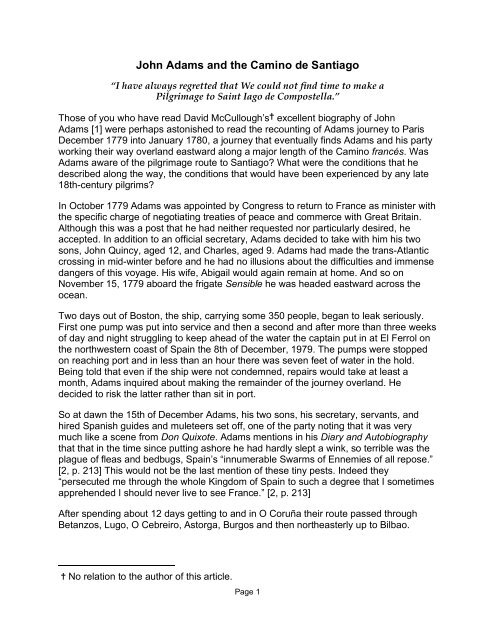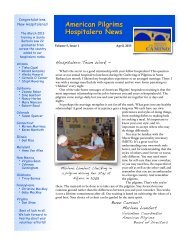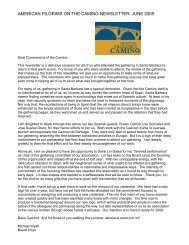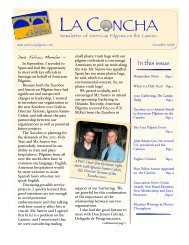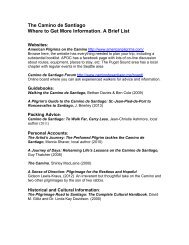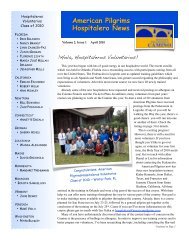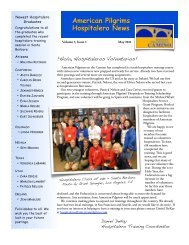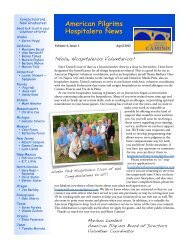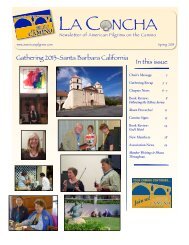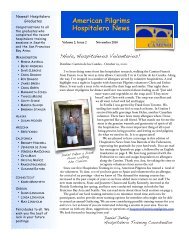John Adams and the Camino de Santiago - American Pilgrims on ...
John Adams and the Camino de Santiago - American Pilgrims on ...
John Adams and the Camino de Santiago - American Pilgrims on ...
Create successful ePaper yourself
Turn your PDF publications into a flip-book with our unique Google optimized e-Paper software.
<str<strong>on</strong>g>John</str<strong>on</strong>g> <str<strong>on</strong>g>Adams</str<strong>on</strong>g> <str<strong>on</strong>g>and</str<strong>on</strong>g> <str<strong>on</strong>g>the</str<strong>on</strong>g> <str<strong>on</strong>g>Camino</str<strong>on</strong>g> <str<strong>on</strong>g>de</str<strong>on</strong>g> <str<strong>on</strong>g>Santiago</str<strong>on</strong>g><br />
“I have always regretted that We could not find time to make a<br />
Pilgrimage to Saint Iago <str<strong>on</strong>g>de</str<strong>on</strong>g> Compostella.”<br />
Those of you who have read David McCullough’s✝ excellent biography of <str<strong>on</strong>g>John</str<strong>on</strong>g><br />
<str<strong>on</strong>g>Adams</str<strong>on</strong>g> [1] were perhaps ast<strong>on</strong>ished to read <str<strong>on</strong>g>the</str<strong>on</strong>g> recounting of <str<strong>on</strong>g>Adams</str<strong>on</strong>g> journey to Paris<br />
December 1779 into January 1780, a journey that eventually finds <str<strong>on</strong>g>Adams</str<strong>on</strong>g> <str<strong>on</strong>g>and</str<strong>on</strong>g> his party<br />
working <str<strong>on</strong>g>the</str<strong>on</strong>g>ir way overl<str<strong>on</strong>g>and</str<strong>on</strong>g> eastward al<strong>on</strong>g a major length of <str<strong>on</strong>g>the</str<strong>on</strong>g> <str<strong>on</strong>g>Camino</str<strong>on</strong>g> francés. Was<br />
<str<strong>on</strong>g>Adams</str<strong>on</strong>g> aware of <str<strong>on</strong>g>the</str<strong>on</strong>g> pilgrimage route to <str<strong>on</strong>g>Santiago</str<strong>on</strong>g>? What were <str<strong>on</strong>g>the</str<strong>on</strong>g> c<strong>on</strong>diti<strong>on</strong>s that he<br />
<str<strong>on</strong>g>de</str<strong>on</strong>g>scribed al<strong>on</strong>g <str<strong>on</strong>g>the</str<strong>on</strong>g> way, <str<strong>on</strong>g>the</str<strong>on</strong>g> c<strong>on</strong>diti<strong>on</strong>s that would have been experienced by any late<br />
18th-century pilgrims?<br />
In October 1779 <str<strong>on</strong>g>Adams</str<strong>on</strong>g> was appointed by C<strong>on</strong>gress to return to France as minister with<br />
<str<strong>on</strong>g>the</str<strong>on</strong>g> specific charge of negotiating treaties of peace <str<strong>on</strong>g>and</str<strong>on</strong>g> commerce with Great Britain.<br />
Although this was a post that he had nei<str<strong>on</strong>g>the</str<strong>on</strong>g>r requested nor particularly <str<strong>on</strong>g>de</str<strong>on</strong>g>sired, he<br />
accepted. In additi<strong>on</strong> to an official secretary, <str<strong>on</strong>g>Adams</str<strong>on</strong>g> <str<strong>on</strong>g>de</str<strong>on</strong>g>ci<str<strong>on</strong>g>de</str<strong>on</strong>g>d to take with him his two<br />
s<strong>on</strong>s, <str<strong>on</strong>g>John</str<strong>on</strong>g> Quincy, aged 12, <str<strong>on</strong>g>and</str<strong>on</strong>g> Charles, aged 9. <str<strong>on</strong>g>Adams</str<strong>on</strong>g> had ma<str<strong>on</strong>g>de</str<strong>on</strong>g> <str<strong>on</strong>g>the</str<strong>on</strong>g> trans-Atlantic<br />
crossing in mid-winter before <str<strong>on</strong>g>and</str<strong>on</strong>g> he had no illusi<strong>on</strong>s about <str<strong>on</strong>g>the</str<strong>on</strong>g> difficulties <str<strong>on</strong>g>and</str<strong>on</strong>g> immense<br />
dangers of this voyage. His wife, Abigail would again remain at home. And so <strong>on</strong><br />
November 15, 1779 aboard <str<strong>on</strong>g>the</str<strong>on</strong>g> frigate Sensible he was hea<str<strong>on</strong>g>de</str<strong>on</strong>g>d eastward across <str<strong>on</strong>g>the</str<strong>on</strong>g><br />
ocean.<br />
Two days out of Bost<strong>on</strong>, <str<strong>on</strong>g>the</str<strong>on</strong>g> ship, carrying some 350 people, began to leak seriously.<br />
First <strong>on</strong>e pump was put into service <str<strong>on</strong>g>and</str<strong>on</strong>g> <str<strong>on</strong>g>the</str<strong>on</strong>g>n a sec<strong>on</strong>d <str<strong>on</strong>g>and</str<strong>on</strong>g> after more than three weeks<br />
of day <str<strong>on</strong>g>and</str<strong>on</strong>g> night struggling to keep ahead of <str<strong>on</strong>g>the</str<strong>on</strong>g> water <str<strong>on</strong>g>the</str<strong>on</strong>g> captain put in at El Ferrol <strong>on</strong><br />
<str<strong>on</strong>g>the</str<strong>on</strong>g> northwestern coast of Spain <str<strong>on</strong>g>the</str<strong>on</strong>g> 8th of December, 1979. The pumps were stopped<br />
<strong>on</strong> reaching port <str<strong>on</strong>g>and</str<strong>on</strong>g> in less than an hour <str<strong>on</strong>g>the</str<strong>on</strong>g>re was seven feet of water in <str<strong>on</strong>g>the</str<strong>on</strong>g> hold.<br />
Being told that even if <str<strong>on</strong>g>the</str<strong>on</strong>g> ship were not c<strong>on</strong><str<strong>on</strong>g>de</str<strong>on</strong>g>mned, repairs would take at least a<br />
m<strong>on</strong>th, <str<strong>on</strong>g>Adams</str<strong>on</strong>g> inquired about making <str<strong>on</strong>g>the</str<strong>on</strong>g> remain<str<strong>on</strong>g>de</str<strong>on</strong>g>r of <str<strong>on</strong>g>the</str<strong>on</strong>g> journey overl<str<strong>on</strong>g>and</str<strong>on</strong>g>. He<br />
<str<strong>on</strong>g>de</str<strong>on</strong>g>ci<str<strong>on</strong>g>de</str<strong>on</strong>g>d to risk <str<strong>on</strong>g>the</str<strong>on</strong>g> latter ra<str<strong>on</strong>g>the</str<strong>on</strong>g>r than sit in port.<br />
So at dawn <str<strong>on</strong>g>the</str<strong>on</strong>g> 15th of December <str<strong>on</strong>g>Adams</str<strong>on</strong>g>, his two s<strong>on</strong>s, his secretary, servants, <str<strong>on</strong>g>and</str<strong>on</strong>g><br />
hired Spanish gui<str<strong>on</strong>g>de</str<strong>on</strong>g>s <str<strong>on</strong>g>and</str<strong>on</strong>g> muleteers set off, <strong>on</strong>e of <str<strong>on</strong>g>the</str<strong>on</strong>g> party noting that it was very<br />
much like a scene from D<strong>on</strong> Quixote. <str<strong>on</strong>g>Adams</str<strong>on</strong>g> menti<strong>on</strong>s in his Diary <str<strong>on</strong>g>and</str<strong>on</strong>g> Autobiography<br />
that that in <str<strong>on</strong>g>the</str<strong>on</strong>g> time since putting ashore he had hardly slept a wink, so terrible was <str<strong>on</strong>g>the</str<strong>on</strong>g><br />
plague of fleas <str<strong>on</strong>g>and</str<strong>on</strong>g> bedbugs, Spain’s “innumerable Swarms of Ennemies of all repose.”<br />
[2, p. 213] This would not be <str<strong>on</strong>g>the</str<strong>on</strong>g> last menti<strong>on</strong> of <str<strong>on</strong>g>the</str<strong>on</strong>g>se tiny pests. In<str<strong>on</strong>g>de</str<strong>on</strong>g>ed <str<strong>on</strong>g>the</str<strong>on</strong>g>y<br />
“persecuted me through <str<strong>on</strong>g>the</str<strong>on</strong>g> whole Kingdom of Spain to such a <str<strong>on</strong>g>de</str<strong>on</strong>g>gree that I sometimes<br />
apprehen<str<strong>on</strong>g>de</str<strong>on</strong>g>d I should never live to see France.” [2, p. 213]<br />
After spending about 12 days getting to <str<strong>on</strong>g>and</str<strong>on</strong>g> in O Coruña <str<strong>on</strong>g>the</str<strong>on</strong>g>ir route passed through<br />
Betanzos, Lugo, O Cebreiro, Astorga, Burgos <str<strong>on</strong>g>and</str<strong>on</strong>g> <str<strong>on</strong>g>the</str<strong>on</strong>g>n nor<str<strong>on</strong>g>the</str<strong>on</strong>g>asterly up to Bilbao.<br />
✝ No relati<strong>on</strong> to <str<strong>on</strong>g>the</str<strong>on</strong>g> author of this article.<br />
Page 1
Shortly after getting un<str<strong>on</strong>g>de</str<strong>on</strong>g>rway <str<strong>on</strong>g>Adams</str<strong>on</strong>g> offers a <str<strong>on</strong>g>de</str<strong>on</strong>g>scripti<strong>on</strong> of <str<strong>on</strong>g>the</str<strong>on</strong>g> accommodati<strong>on</strong>s <str<strong>on</strong>g>the</str<strong>on</strong>g>y<br />
were affor<str<strong>on</strong>g>de</str<strong>on</strong>g>d. Imagery like this was repeated numerous times al<strong>on</strong>g <str<strong>on</strong>g>the</str<strong>on</strong>g> route. But let’s<br />
let <str<strong>on</strong>g>Adams</str<strong>on</strong>g> tell <str<strong>on</strong>g>the</str<strong>on</strong>g> story in his own words. From his autobiography he writes:<br />
M<strong>on</strong>day, December 27, 1779: We travelled from Betanzos to Castillano. …The House in<br />
Castillano where We lodged was of St<strong>on</strong>e, two Stories in height. We entered into <str<strong>on</strong>g>the</str<strong>on</strong>g><br />
Kitchen, where was no floor but <str<strong>on</strong>g>the</str<strong>on</strong>g> Ground <str<strong>on</strong>g>and</str<strong>on</strong>g> no Carpet but Straw trod<str<strong>on</strong>g>de</str<strong>on</strong>g>n into mire<br />
by Men, Hogs, horses <str<strong>on</strong>g>and</str<strong>on</strong>g> Mules. In <str<strong>on</strong>g>the</str<strong>on</strong>g> middle of <str<strong>on</strong>g>the</str<strong>on</strong>g> Kitchen was a Mound raised a<br />
little above <str<strong>on</strong>g>the</str<strong>on</strong>g> Level of <str<strong>on</strong>g>the</str<strong>on</strong>g> Ground with St<strong>on</strong>es <str<strong>on</strong>g>and</str<strong>on</strong>g> Earth, <strong>on</strong> which was a fire, with<br />
Potts, Kettles, Skillets &c. of <str<strong>on</strong>g>the</str<strong>on</strong>g> fashi<strong>on</strong> of <str<strong>on</strong>g>the</str<strong>on</strong>g> Country, over it, <str<strong>on</strong>g>and</str<strong>on</strong>g> round about it. There<br />
was no Chimney [so smoke] filled <str<strong>on</strong>g>the</str<strong>on</strong>g> room <str<strong>on</strong>g>and</str<strong>on</strong>g> if any of it ascen<str<strong>on</strong>g>de</str<strong>on</strong>g>d, it found no o<str<strong>on</strong>g>the</str<strong>on</strong>g>r<br />
passage to <str<strong>on</strong>g>the</str<strong>on</strong>g> open Air, but through two holes drilled through <str<strong>on</strong>g>the</str<strong>on</strong>g> Tyles of <str<strong>on</strong>g>the</str<strong>on</strong>g> roof, not<br />
perpendicularly over <str<strong>on</strong>g>the</str<strong>on</strong>g> fire, but at Angles of about forty five <str<strong>on</strong>g>de</str<strong>on</strong>g>grees. On <strong>on</strong>e Si<str<strong>on</strong>g>de</str<strong>on</strong>g> was<br />
a flew Oven, very large, black, smoaky <str<strong>on</strong>g>and</str<strong>on</strong>g> sooty. On <str<strong>on</strong>g>the</str<strong>on</strong>g> opposite Si<str<strong>on</strong>g>de</str<strong>on</strong>g> of <str<strong>on</strong>g>the</str<strong>on</strong>g> fire was a<br />
Cabbin filled with Straw where I suppose <str<strong>on</strong>g>the</str<strong>on</strong>g> Patr<strong>on</strong> <str<strong>on</strong>g>de</str<strong>on</strong>g>l Casa, that is, <str<strong>on</strong>g>the</str<strong>on</strong>g> Master of <str<strong>on</strong>g>the</str<strong>on</strong>g><br />
House, his Wife <str<strong>on</strong>g>and</str<strong>on</strong>g> four Chilldren, all lodged <str<strong>on</strong>g>and</str<strong>on</strong>g> slept toge<str<strong>on</strong>g>the</str<strong>on</strong>g>r. On <str<strong>on</strong>g>the</str<strong>on</strong>g> same floor or<br />
ra<str<strong>on</strong>g>the</str<strong>on</strong>g>r <strong>on</strong> <str<strong>on</strong>g>the</str<strong>on</strong>g> same level of Ground, with <str<strong>on</strong>g>the</str<strong>on</strong>g> Kitchen was <str<strong>on</strong>g>the</str<strong>on</strong>g> Stable. There was in<str<strong>on</strong>g>de</str<strong>on</strong>g>ed a<br />
Door which might have parted <str<strong>on</strong>g>the</str<strong>on</strong>g> Kitchen from <str<strong>on</strong>g>the</str<strong>on</strong>g> Stable: but this was always open,<br />
<str<strong>on</strong>g>and</str<strong>on</strong>g> in<str<strong>on</strong>g>de</str<strong>on</strong>g>ed it would have been impossible to see or breath with it shut: <str<strong>on</strong>g>and</str<strong>on</strong>g> <str<strong>on</strong>g>the</str<strong>on</strong>g> floor or<br />
ground of <str<strong>on</strong>g>the</str<strong>on</strong>g> Stable, was covered with miry Straw like <str<strong>on</strong>g>the</str<strong>on</strong>g> Kitchen. …The Smoke filled<br />
every part of <str<strong>on</strong>g>the</str<strong>on</strong>g> Kitchen, Stable, <str<strong>on</strong>g>and</str<strong>on</strong>g> all o<str<strong>on</strong>g>the</str<strong>on</strong>g>r parts of <str<strong>on</strong>g>the</str<strong>on</strong>g> House, <str<strong>on</strong>g>and</str<strong>on</strong>g> was so thick that<br />
it was very difficult to see or breath. There was a flight of Steps of St<strong>on</strong>e covered with<br />
Mud <str<strong>on</strong>g>and</str<strong>on</strong>g> Straw, from <str<strong>on</strong>g>the</str<strong>on</strong>g> Kitchen floor up into a Chamber. On <str<strong>on</strong>g>the</str<strong>on</strong>g> left h<str<strong>on</strong>g>and</str<strong>on</strong>g> as you<br />
ascen<str<strong>on</strong>g>de</str<strong>on</strong>g>d <str<strong>on</strong>g>the</str<strong>on</strong>g> Stairs, was a Stage, built up about half Way from <str<strong>on</strong>g>the</str<strong>on</strong>g> Kitchen floor to <str<strong>on</strong>g>the</str<strong>on</strong>g><br />
Chamber floor. On this Stage was a bed of Straw <str<strong>on</strong>g>and</str<strong>on</strong>g> <strong>on</strong> <str<strong>on</strong>g>the</str<strong>on</strong>g> Straw lay, a fatting hog.<br />
Around <str<strong>on</strong>g>the</str<strong>on</strong>g> Kitchen fire were arranged <str<strong>on</strong>g>the</str<strong>on</strong>g> Man <str<strong>on</strong>g>and</str<strong>on</strong>g> Woman of <str<strong>on</strong>g>the</str<strong>on</strong>g> House, four Children,<br />
all <str<strong>on</strong>g>the</str<strong>on</strong>g> Travellers, Servants, Mulateers &c. Over <str<strong>on</strong>g>the</str<strong>on</strong>g> Fire was a very large Kettle, like a<br />
Pot Ash Kettle, full of Turnips <str<strong>on</strong>g>and</str<strong>on</strong>g> Oni<strong>on</strong>s, very large <str<strong>on</strong>g>and</str<strong>on</strong>g> very fine boiling for <str<strong>on</strong>g>the</str<strong>on</strong>g> Food of<br />
all <str<strong>on</strong>g>the</str<strong>on</strong>g> Family of Men <str<strong>on</strong>g>and</str<strong>on</strong>g> Beasts inhabiting both <str<strong>on</strong>g>the</str<strong>on</strong>g> Kitchen <str<strong>on</strong>g>and</str<strong>on</strong>g> <str<strong>on</strong>g>the</str<strong>on</strong>g> Stable, <str<strong>on</strong>g>and</str<strong>on</strong>g> <str<strong>on</strong>g>the</str<strong>on</strong>g><br />
Stage. [2, p. 214]<br />
The 1801 <str<strong>on</strong>g>John</str<strong>on</strong>g> Cary map of nor<str<strong>on</strong>g>the</str<strong>on</strong>g>rn Spain showing <str<strong>on</strong>g>Adams</str<strong>on</strong>g>’ route (solid line) <str<strong>on</strong>g>and</str<strong>on</strong>g><br />
<str<strong>on</strong>g>the</str<strong>on</strong>g> mo<str<strong>on</strong>g>de</str<strong>on</strong>g>rn <str<strong>on</strong>g>Camino</str<strong>on</strong>g> francés (blue solid <str<strong>on</strong>g>and</str<strong>on</strong>g> dashed line).<br />
<str<strong>on</strong>g>Adams</str<strong>on</strong>g> was apparently well aware of <str<strong>on</strong>g>the</str<strong>on</strong>g> pilgrimage to <str<strong>on</strong>g>Santiago</str<strong>on</strong>g> <str<strong>on</strong>g>and</str<strong>on</strong>g> its significance.<br />
Tuesday, December 28, 1779: I have always regretted that We could not find time to<br />
make a Pilgrimage to Saint Iago <str<strong>on</strong>g>de</str<strong>on</strong>g> Compostella. We were informed, particularly by Mr.<br />
Page 2
Lagoanere, that <str<strong>on</strong>g>the</str<strong>on</strong>g> Original of this Shrine <str<strong>on</strong>g>and</str<strong>on</strong>g> Temple of St. Iago was this. A certain<br />
Shepherd saw a bright Light <str<strong>on</strong>g>the</str<strong>on</strong>g>re in <str<strong>on</strong>g>the</str<strong>on</strong>g> night. Afterwards it was revealed to an<br />
Archbishop that St. James was buried <str<strong>on</strong>g>the</str<strong>on</strong>g>re. This laid <str<strong>on</strong>g>the</str<strong>on</strong>g> Foundati<strong>on</strong> of a Church, <str<strong>on</strong>g>and</str<strong>on</strong>g><br />
<str<strong>on</strong>g>the</str<strong>on</strong>g>y have built an Altar <strong>on</strong> <str<strong>on</strong>g>the</str<strong>on</strong>g> Spot where <str<strong>on</strong>g>the</str<strong>on</strong>g> Shepherd saw <str<strong>on</strong>g>the</str<strong>on</strong>g> Light. In <str<strong>on</strong>g>the</str<strong>on</strong>g> time of <str<strong>on</strong>g>the</str<strong>on</strong>g><br />
Moors, <str<strong>on</strong>g>the</str<strong>on</strong>g> People ma<str<strong>on</strong>g>de</str<strong>on</strong>g> a Vow, that if <str<strong>on</strong>g>the</str<strong>on</strong>g> Moors should be driven from this Country,<br />
<str<strong>on</strong>g>the</str<strong>on</strong>g>y would give a certain porti<strong>on</strong> of <str<strong>on</strong>g>the</str<strong>on</strong>g> Income of <str<strong>on</strong>g>the</str<strong>on</strong>g>ir L<str<strong>on</strong>g>and</str<strong>on</strong>g>s to Saint James. The Moors<br />
were <str<strong>on</strong>g>de</str<strong>on</strong>g>feated <str<strong>on</strong>g>and</str<strong>on</strong>g> expelled <str<strong>on</strong>g>and</str<strong>on</strong>g> it was reported <str<strong>on</strong>g>and</str<strong>on</strong>g> believed, that Saint James was in<br />
<str<strong>on</strong>g>the</str<strong>on</strong>g> Battle <str<strong>on</strong>g>and</str<strong>on</strong>g> fought with a drawn Sword at <str<strong>on</strong>g>the</str<strong>on</strong>g> head of <str<strong>on</strong>g>the</str<strong>on</strong>g> Spanis[h] Troops, <strong>on</strong><br />
Horseback. The People, believing that <str<strong>on</strong>g>the</str<strong>on</strong>g>y owed <str<strong>on</strong>g>the</str<strong>on</strong>g> Victory to <str<strong>on</strong>g>the</str<strong>on</strong>g> Saint, very chearfully<br />
fulfilled <str<strong>on</strong>g>the</str<strong>on</strong>g>ir Vows by paying <str<strong>on</strong>g>the</str<strong>on</strong>g> Tribute.… [2, p. 217]<br />
<str<strong>on</strong>g>Adams</str<strong>on</strong>g> was always <str<strong>on</strong>g>the</str<strong>on</strong>g> caustic, acerbic New Engl<str<strong>on</strong>g>and</str<strong>on</strong>g>er <str<strong>on</strong>g>and</str<strong>on</strong>g> he had little use for clergy<br />
generally. He certainly did not spare Catholic clergy <str<strong>on</strong>g>and</str<strong>on</strong>g> his narrative is la<str<strong>on</strong>g>de</str<strong>on</strong>g>n with<br />
excoriating remarks.<br />
Thursday, December 30, 1779: We went from Lugo to Galliego <str<strong>on</strong>g>and</str<strong>on</strong>g> arrived in good<br />
Seas<strong>on</strong>, having ma<str<strong>on</strong>g>de</str<strong>on</strong>g> six Leagues <str<strong>on</strong>g>and</str<strong>on</strong>g> an half✝ from Lugo. …I saw nothing but Signs of<br />
Poverty <str<strong>on</strong>g>and</str<strong>on</strong>g> misery am<strong>on</strong>g <str<strong>on</strong>g>the</str<strong>on</strong>g> People: a fertile Country not half cultivated: People<br />
ragged <str<strong>on</strong>g>and</str<strong>on</strong>g> dirty: <str<strong>on</strong>g>the</str<strong>on</strong>g> Houses universally nothing but mire, Smoke, Soot, fleas <str<strong>on</strong>g>and</str<strong>on</strong>g> Lice:<br />
nothing appeared rich but <str<strong>on</strong>g>the</str<strong>on</strong>g> Churches, nobody fat but <str<strong>on</strong>g>the</str<strong>on</strong>g> Clergy. Many of <str<strong>on</strong>g>the</str<strong>on</strong>g> Villages<br />
We passed, were built with Mud filled in between joists, Nine tenths of <str<strong>on</strong>g>the</str<strong>on</strong>g>m uninhabited<br />
<str<strong>on</strong>g>and</str<strong>on</strong>g> moul<str<strong>on</strong>g>de</str<strong>on</strong>g>ring to dust. Yet in every <strong>on</strong>e of <str<strong>on</strong>g>the</str<strong>on</strong>g>se Scenes of <str<strong>on</strong>g>de</str<strong>on</strong>g>solati<strong>on</strong>, you would see a<br />
splendid Church, <str<strong>on</strong>g>and</str<strong>on</strong>g> here <str<strong>on</strong>g>and</str<strong>on</strong>g> <str<strong>on</strong>g>the</str<strong>on</strong>g>re a rosy faced Priest in his proud Can<strong>on</strong>icals<br />
rambling am<strong>on</strong>g <str<strong>on</strong>g>the</str<strong>on</strong>g> rubbish of <str<strong>on</strong>g>the</str<strong>on</strong>g> Village. [2, p. 218]<br />
The party passes through O Cebreiro, Villafranca <str<strong>on</strong>g>and</str<strong>on</strong>g> Rabanal <str<strong>on</strong>g>de</str<strong>on</strong>g>l <str<strong>on</strong>g>Camino</str<strong>on</strong>g> to Astorga.<br />
Friday, December 31, 1779: We ro<str<strong>on</strong>g>de</str<strong>on</strong>g> from Galliego to Sebrero, seven Leagues. Our<br />
journey was more agreable this day, than usual: <str<strong>on</strong>g>the</str<strong>on</strong>g> Wea<str<strong>on</strong>g>the</str<strong>on</strong>g>r was remarkably fair <str<strong>on</strong>g>and</str<strong>on</strong>g><br />
dry, <str<strong>on</strong>g>and</str<strong>on</strong>g> <str<strong>on</strong>g>the</str<strong>on</strong>g> roads not so bad as We had expected. There was <str<strong>on</strong>g>the</str<strong>on</strong>g> gr<str<strong>on</strong>g>and</str<strong>on</strong>g>est profusi<strong>on</strong> of<br />
wild irregular Mountains I ever saw: yet laboured <str<strong>on</strong>g>and</str<strong>on</strong>g> cultivated to <str<strong>on</strong>g>the</str<strong>on</strong>g>ir Summits.… [2,<br />
p. 218]<br />
Saturday, January 1, 1780: We arrived, from Sebrero, at Villa Franca, seven Leagues.<br />
…The Houses had been uniformly <str<strong>on</strong>g>the</str<strong>on</strong>g> same, through <str<strong>on</strong>g>the</str<strong>on</strong>g> whole Country hi<str<strong>on</strong>g>the</str<strong>on</strong>g>rto.<br />
Comm<strong>on</strong> habitati<strong>on</strong>s for Men <str<strong>on</strong>g>and</str<strong>on</strong>g> Beasts. The same smoaky, filthy Dens. Not <strong>on</strong>e<br />
<str<strong>on</strong>g>de</str<strong>on</strong>g>cent house had I seen, since I left Corunna. [2, p. 219]<br />
M<strong>on</strong>day, January 3, 1780: We ro<str<strong>on</strong>g>de</str<strong>on</strong>g> to Astorga. We passed through <str<strong>on</strong>g>the</str<strong>on</strong>g> Town <str<strong>on</strong>g>and</str<strong>on</strong>g><br />
Country of <str<strong>on</strong>g>the</str<strong>on</strong>g> Marragattoes. The Town is small <str<strong>on</strong>g>and</str<strong>on</strong>g> st<str<strong>on</strong>g>and</str<strong>on</strong>g>s <strong>on</strong> a brook in a great Plain.<br />
As We went into Astorga, We met Coaches <str<strong>on</strong>g>and</str<strong>on</strong>g> genteel People. [2, p. 220]<br />
The party arrives in Astorga <str<strong>on</strong>g>and</str<strong>on</strong>g> <str<strong>on</strong>g>Adams</str<strong>on</strong>g> makes perhaps his first positive remarks about<br />
<str<strong>on</strong>g>the</str<strong>on</strong>g> journey <str<strong>on</strong>g>and</str<strong>on</strong>g> <str<strong>on</strong>g>the</str<strong>on</strong>g> towns <str<strong>on</strong>g>and</str<strong>on</strong>g> villages <str<strong>on</strong>g>the</str<strong>on</strong>g>y were passing through.<br />
Tuesday, January 4, 1780: At Astorga, We found clean Beds <str<strong>on</strong>g>and</str<strong>on</strong>g> no fleas for <str<strong>on</strong>g>the</str<strong>on</strong>g> first<br />
time since We had been in Spain. Walked twice round <str<strong>on</strong>g>the</str<strong>on</strong>g> Walls of <str<strong>on</strong>g>the</str<strong>on</strong>g> City, which are<br />
very ancient. We saw <str<strong>on</strong>g>the</str<strong>on</strong>g> Road to Le<strong>on</strong> <str<strong>on</strong>g>and</str<strong>on</strong>g> Bay<strong>on</strong>ne <str<strong>on</strong>g>and</str<strong>on</strong>g> <str<strong>on</strong>g>the</str<strong>on</strong>g> road to Madrid. There is a<br />
pleasant Prospect of <str<strong>on</strong>g>the</str<strong>on</strong>g> Country from <str<strong>on</strong>g>the</str<strong>on</strong>g> Walls. Saw <str<strong>on</strong>g>the</str<strong>on</strong>g> Market of Vegetables. The<br />
Oni<strong>on</strong>s <str<strong>on</strong>g>and</str<strong>on</strong>g> Turnips were <str<strong>on</strong>g>the</str<strong>on</strong>g> largest <str<strong>on</strong>g>and</str<strong>on</strong>g> finest I ever saw. The Cabbages, Carrots &c.<br />
appeared very good. Saw <str<strong>on</strong>g>the</str<strong>on</strong>g> Markett of Fuel, which c<strong>on</strong>sisted of Wood, Coal, Turf <str<strong>on</strong>g>and</str<strong>on</strong>g><br />
Brush.<br />
✝ 1 league = 3 statute miles or about 4.8 km<br />
Page 3
We went to see <str<strong>on</strong>g>the</str<strong>on</strong>g> Ca<str<strong>on</strong>g>the</str<strong>on</strong>g>dral Church which is <str<strong>on</strong>g>the</str<strong>on</strong>g> most magnificent I had yet seen in<br />
Spain. [2, p. 220]<br />
Wednesday, January 5, 1780: We ro<str<strong>on</strong>g>de</str<strong>on</strong>g> from Astorga to Le<strong>on</strong>, Eight Leagues. This was<br />
<strong>on</strong>e great Plain, <str<strong>on</strong>g>and</str<strong>on</strong>g> <str<strong>on</strong>g>the</str<strong>on</strong>g> road through it was very fine. We saw large Herds of Cattle <str<strong>on</strong>g>and</str<strong>on</strong>g><br />
immense flocks of Sheep. The Sheep were of an h<str<strong>on</strong>g>and</str<strong>on</strong>g>some Size, <str<strong>on</strong>g>and</str<strong>on</strong>g> <str<strong>on</strong>g>the</str<strong>on</strong>g>ir fleeces of<br />
Wool thick, l<strong>on</strong>g <str<strong>on</strong>g>and</str<strong>on</strong>g> extreamly fine. The Soil appeared to be ra<str<strong>on</strong>g>the</str<strong>on</strong>g>r thin <str<strong>on</strong>g>and</str<strong>on</strong>g> barren. We<br />
passed several small Villages, <str<strong>on</strong>g>the</str<strong>on</strong>g> vast range of Asturias Mountains all covered with<br />
Snow <strong>on</strong> our left h<str<strong>on</strong>g>and</str<strong>on</strong>g>. …Le<strong>on</strong>, which We entered in <str<strong>on</strong>g>the</str<strong>on</strong>g> night, had <str<strong>on</strong>g>the</str<strong>on</strong>g> Appearance of a<br />
large City. [2, p. 221]<br />
<str<strong>on</strong>g>Adams</str<strong>on</strong>g> attends Mass in León <str<strong>on</strong>g>and</str<strong>on</strong>g> attracts <str<strong>on</strong>g>the</str<strong>on</strong>g> attenti<strong>on</strong> of <str<strong>on</strong>g>the</str<strong>on</strong>g> Bishop, not favorably.<br />
Thursday, January 6, 1780: We went to see <str<strong>on</strong>g>the</str<strong>on</strong>g> Ca<str<strong>on</strong>g>the</str<strong>on</strong>g>dral Church at Le<strong>on</strong> which though<br />
magnificent, is not equal to that at Astorga, if it is to that at Lugo. It was <str<strong>on</strong>g>the</str<strong>on</strong>g> day of <str<strong>on</strong>g>the</str<strong>on</strong>g><br />
Feast of <str<strong>on</strong>g>the</str<strong>on</strong>g> King <str<strong>on</strong>g>and</str<strong>on</strong>g> We happened to be at <str<strong>on</strong>g>the</str<strong>on</strong>g> celebrati<strong>on</strong> of High Mass. We saw <str<strong>on</strong>g>the</str<strong>on</strong>g><br />
Processi<strong>on</strong> of <str<strong>on</strong>g>the</str<strong>on</strong>g> Bishop <str<strong>on</strong>g>and</str<strong>on</strong>g> of all <str<strong>on</strong>g>the</str<strong>on</strong>g> Can<strong>on</strong>s, in rich habits of Silk, Velvet, Silver <str<strong>on</strong>g>and</str<strong>on</strong>g><br />
gold. The Bishop as he turned <str<strong>on</strong>g>the</str<strong>on</strong>g> Corners of <str<strong>on</strong>g>the</str<strong>on</strong>g> Church spred out his h<str<strong>on</strong>g>and</str<strong>on</strong>g> to <str<strong>on</strong>g>the</str<strong>on</strong>g><br />
People, in token of his Apostolical Benedicti<strong>on</strong>; <str<strong>on</strong>g>and</str<strong>on</strong>g> those, in token of <str<strong>on</strong>g>the</str<strong>on</strong>g>ir profound<br />
gratitu<str<strong>on</strong>g>de</str<strong>on</strong>g> for <str<strong>on</strong>g>the</str<strong>on</strong>g> heavenly Blessing prostrated <str<strong>on</strong>g>the</str<strong>on</strong>g>mselves <strong>on</strong> <str<strong>on</strong>g>the</str<strong>on</strong>g>ir Knees as he passed.<br />
Our Gui<str<strong>on</strong>g>de</str<strong>on</strong>g> told Us We must do <str<strong>on</strong>g>the</str<strong>on</strong>g> same. But I c<strong>on</strong>tented myself with a Bow. The Eagle<br />
Eye of <str<strong>on</strong>g>the</str<strong>on</strong>g> Bishop did not fail to observe an Upright figure amidst <str<strong>on</strong>g>the</str<strong>on</strong>g> Crowd of prostrate<br />
Adorers: but no doubt perceiving in my Countenance <str<strong>on</strong>g>and</str<strong>on</strong>g> Air, but especially in my dress<br />
something that was not Spanish, he c<strong>on</strong>clu<str<strong>on</strong>g>de</str<strong>on</strong>g>d I was some travelling Heretick <str<strong>on</strong>g>and</str<strong>on</strong>g> did<br />
not think it worth while to exert his Authority to bend my stiff Knees. His Eyes followed<br />
me so l<strong>on</strong>g that I thought I saw in his Countenance a reproof like this "You are not <strong>on</strong>ly a<br />
Heretick but you are not a Gentleman, for a Gentleman would have respected <str<strong>on</strong>g>the</str<strong>on</strong>g><br />
Religi<strong>on</strong> of <str<strong>on</strong>g>the</str<strong>on</strong>g> Country <str<strong>on</strong>g>and</str<strong>on</strong>g> its Usages so far as to have c<strong>on</strong>formed externally to a<br />
Cerem<strong>on</strong>y that cost so little." [2, p. 221]<br />
Friday, January 7, 1780: From Mansillas We ro<str<strong>on</strong>g>de</str<strong>on</strong>g> to San Juan Segun. [2, p. 224]<br />
The party passes over <str<strong>on</strong>g>the</str<strong>on</strong>g> meseta.<br />
Saturday, January 8, 1780: We ro<str<strong>on</strong>g>de</str<strong>on</strong>g> from San Juan Segun to Paredise <str<strong>on</strong>g>de</str<strong>on</strong>g> Nava. …The<br />
Villages all appear going to <str<strong>on</strong>g>de</str<strong>on</strong>g>cay <str<strong>on</strong>g>and</str<strong>on</strong>g> crumbling to dust. Can this be <str<strong>on</strong>g>the</str<strong>on</strong>g> ancient<br />
Kingdom of Le<strong>on</strong>? Never<str<strong>on</strong>g>the</str<strong>on</strong>g>less every Village has Churches <str<strong>on</strong>g>and</str<strong>on</strong>g> C<strong>on</strong>vents enough in it,<br />
to ruin it, <str<strong>on</strong>g>and</str<strong>on</strong>g> <str<strong>on</strong>g>the</str<strong>on</strong>g> whole Country round about it; even if <str<strong>on</strong>g>the</str<strong>on</strong>g>y had nothing to pay to <str<strong>on</strong>g>the</str<strong>on</strong>g><br />
King, or <str<strong>on</strong>g>the</str<strong>on</strong>g> L<str<strong>on</strong>g>and</str<strong>on</strong>g>lords. But all three toge<str<strong>on</strong>g>the</str<strong>on</strong>g>r Church, State <str<strong>on</strong>g>and</str<strong>on</strong>g> Nobility exhaust <str<strong>on</strong>g>the</str<strong>on</strong>g><br />
Labour <str<strong>on</strong>g>and</str<strong>on</strong>g> Spirits of <str<strong>on</strong>g>the</str<strong>on</strong>g> People to such a <str<strong>on</strong>g>de</str<strong>on</strong>g>gree, that I had no I<str<strong>on</strong>g>de</str<strong>on</strong>g>a of <str<strong>on</strong>g>the</str<strong>on</strong>g> Possibility of<br />
<str<strong>on</strong>g>de</str<strong>on</strong>g>eper Wretchedness. …There were in this little Village four Parish Churches <str<strong>on</strong>g>and</str<strong>on</strong>g> two<br />
C<strong>on</strong>vents <strong>on</strong>e of M<strong>on</strong>ks <str<strong>on</strong>g>and</str<strong>on</strong>g> <strong>on</strong>e of Nuns, both of <str<strong>on</strong>g>the</str<strong>on</strong>g> or<str<strong>on</strong>g>de</str<strong>on</strong>g>r of St. Francis. [2, p. 224]<br />
From Astorga to this place Paredise <str<strong>on</strong>g>de</str<strong>on</strong>g> Nava, <str<strong>on</strong>g>the</str<strong>on</strong>g> Face of <str<strong>on</strong>g>the</str<strong>on</strong>g> Country was a great plain,<br />
<str<strong>on</strong>g>and</str<strong>on</strong>g> a striking C<strong>on</strong>trast to all <str<strong>on</strong>g>the</str<strong>on</strong>g> rest of <str<strong>on</strong>g>the</str<strong>on</strong>g> Country We had passed from Ferrol. But<br />
<str<strong>on</strong>g>the</str<strong>on</strong>g>re was little Appearance [of] Improvement, Industry or Cultivati<strong>on</strong>. Scarcely any<br />
Trees. No Forrest, Timber or fruit Trees. No Fences except a few Mud Walls for Sheep<br />
folds. This night We reached Sellada el <str<strong>on</strong>g>Camino</str<strong>on</strong>g>. [2, p. 225]<br />
The party arrives in Burgos <str<strong>on</strong>g>and</str<strong>on</strong>g> <str<strong>on</strong>g>Adams</str<strong>on</strong>g> is led to make fur<str<strong>on</strong>g>the</str<strong>on</strong>g>r biting remarks about <str<strong>on</strong>g>the</str<strong>on</strong>g><br />
Church <str<strong>on</strong>g>and</str<strong>on</strong>g> <str<strong>on</strong>g>the</str<strong>on</strong>g> clergy.<br />
Tuesday, January 11, 1780: We arrived at Burgos, from Sellada el <str<strong>on</strong>g>Camino</str<strong>on</strong>g>s, four<br />
Leagues. We had fog, rain, <str<strong>on</strong>g>and</str<strong>on</strong>g> Snow all <str<strong>on</strong>g>the</str<strong>on</strong>g> Way, very chilly <str<strong>on</strong>g>and</str<strong>on</strong>g> raw. …We went out to<br />
Page 4
see <str<strong>on</strong>g>the</str<strong>on</strong>g> Ca<str<strong>on</strong>g>the</str<strong>on</strong>g>dral which was ancient <str<strong>on</strong>g>and</str<strong>on</strong>g> very large. The whole Building was supported<br />
by four gr<str<strong>on</strong>g>and</str<strong>on</strong>g> Pillars <str<strong>on</strong>g>the</str<strong>on</strong>g> largest I ever had seen. [2, p. 225]<br />
For more than twenty Years I had been almost c<strong>on</strong>tinually engaged in Journeys <str<strong>on</strong>g>and</str<strong>on</strong>g><br />
Voyages <str<strong>on</strong>g>and</str<strong>on</strong>g> had often un<str<strong>on</strong>g>de</str<strong>on</strong>g>rg<strong>on</strong>e severe Tryals, as I thought; great hardships, cold,<br />
rain, Snow, heat, fatigue, bad rest, indifferent nourishment, want of Sleep &c. &c. &c. But<br />
I had never experienced any Thing like this journey. If it were now left to my Choice to<br />
perform my first Voyage to Europe with all its horrors, or this journey through Spain, I<br />
should prefer <str<strong>on</strong>g>the</str<strong>on</strong>g> former. …In my whole Life my Patience was never so near being<br />
totally exhausted. [2, p. 225]<br />
There were some few Tra<str<strong>on</strong>g>de</str<strong>on</strong>g>s <str<strong>on</strong>g>and</str<strong>on</strong>g> a little Appearance of Business here; but <str<strong>on</strong>g>the</str<strong>on</strong>g> principal<br />
Occupati<strong>on</strong> was Religi<strong>on</strong>. Up<strong>on</strong> my expressing some Curiosity to [know] <str<strong>on</strong>g>the</str<strong>on</strong>g> Number of<br />
Religious Houses in Burgos, which appeared to me to be enough to <str<strong>on</strong>g>de</str<strong>on</strong>g>vour a whole<br />
Country for an hundred miles round, our Gui<str<strong>on</strong>g>de</str<strong>on</strong>g> went out <str<strong>on</strong>g>and</str<strong>on</strong>g> procured me <str<strong>on</strong>g>the</str<strong>on</strong>g> following<br />
Informati<strong>on</strong>. [<str<strong>on</strong>g>Adams</str<strong>on</strong>g> <str<strong>on</strong>g>the</str<strong>on</strong>g>n lists 33 m<strong>on</strong>asteries, c<strong>on</strong>vents <str<strong>on</strong>g>and</str<strong>on</strong>g> churches.] …what an Army<br />
of Ecclesiasticks is this for so small a Town as Burgos. [2, p. 226]<br />
The next day <str<strong>on</strong>g>Adams</str<strong>on</strong>g>’ party left <str<strong>on</strong>g>the</str<strong>on</strong>g> present-day <str<strong>on</strong>g>Camino</str<strong>on</strong>g> francés route heading nor<str<strong>on</strong>g>the</str<strong>on</strong>g>ast<br />
<str<strong>on</strong>g>the</str<strong>on</strong>g>n north, arriving in Bilbao <strong>on</strong> Saturday, January 15, 1780. They c<strong>on</strong>tinued <strong>on</strong> to Paris<br />
arriving <strong>on</strong> February 9th after a journey of two m<strong>on</strong>ths. In his first letter to C<strong>on</strong>gress<br />
up<strong>on</strong> arriving in Paris he reported that <str<strong>on</strong>g>the</str<strong>on</strong>g>y were all “in tollerable health, after a journey<br />
of near four hundred Leagues in <str<strong>on</strong>g>the</str<strong>on</strong>g> <str<strong>on</strong>g>de</str<strong>on</strong>g>ad of Winter, through bad roads <str<strong>on</strong>g>and</str<strong>on</strong>g> worse<br />
Accommodati<strong>on</strong>s of every kind. We lost no time more than was indispensable to restore<br />
our health, which was several times much affected <str<strong>on</strong>g>and</str<strong>on</strong>g> in great danger: yet We were<br />
more than twice as l<strong>on</strong>g in making <str<strong>on</strong>g>the</str<strong>on</strong>g> journey by L<str<strong>on</strong>g>and</str<strong>on</strong>g>, as We had been in crossing <str<strong>on</strong>g>the</str<strong>on</strong>g><br />
Atlantic Ocean.” [2, p. 240]<br />
So <str<strong>on</strong>g>the</str<strong>on</strong>g> <str<strong>on</strong>g>Camino</str<strong>on</strong>g> was in 1790 certainly alive enough that <str<strong>on</strong>g>John</str<strong>on</strong>g> <str<strong>on</strong>g>Adams</str<strong>on</strong>g> was aware of its<br />
existence. In fact about <str<strong>on</strong>g>Santiago</str<strong>on</strong>g> he remarks: “…<str<strong>on</strong>g>the</str<strong>on</strong>g>re are great numbers of <str<strong>on</strong>g>Pilgrims</str<strong>on</strong>g>,<br />
who visit it, every Year, from France, Spain, Italy <str<strong>on</strong>g>and</str<strong>on</strong>g> o<str<strong>on</strong>g>the</str<strong>on</strong>g>r parts of Europe, many of<br />
<str<strong>on</strong>g>the</str<strong>on</strong>g>m <strong>on</strong> foot.” [2, p. 217] And he was aware enough of its importance to have remarked<br />
“I have always regretted that We could not find time to make a Pilgrimage to Saint Iago<br />
<str<strong>on</strong>g>de</str<strong>on</strong>g> Compostella.” [2, p. 217] Also scattered throughout his account are <str<strong>on</strong>g>de</str<strong>on</strong>g>scripti<strong>on</strong>s of<br />
c<strong>on</strong>diti<strong>on</strong>s al<strong>on</strong>g <str<strong>on</strong>g>the</str<strong>on</strong>g> route at that time, c<strong>on</strong>diti<strong>on</strong>s that can <strong>on</strong>ly be <str<strong>on</strong>g>de</str<strong>on</strong>g>scribed as horrific.<br />
<str<strong>on</strong>g>Adams</str<strong>on</strong>g>’ New Engl<str<strong>on</strong>g>and</str<strong>on</strong>g> cynicism about clergy, Catholic clergy in particular, is more than<br />
evi<str<strong>on</strong>g>de</str<strong>on</strong>g>nt in his account. In<str<strong>on</strong>g>de</str<strong>on</strong>g>ed while he places <str<strong>on</strong>g>the</str<strong>on</strong>g> blame for <str<strong>on</strong>g>the</str<strong>on</strong>g> c<strong>on</strong>diti<strong>on</strong>s that he<br />
encounters — poverty, misery, hopelessness — <strong>on</strong> <str<strong>on</strong>g>the</str<strong>on</strong>g> collective shoul<str<strong>on</strong>g>de</str<strong>on</strong>g>rs of <str<strong>on</strong>g>the</str<strong>on</strong>g><br />
“Church, State <str<strong>on</strong>g>and</str<strong>on</strong>g> Nobility" [2, p. 224] he singles out <str<strong>on</strong>g>the</str<strong>on</strong>g> clergy for special<br />
c<strong>on</strong><str<strong>on</strong>g>de</str<strong>on</strong>g>mnati<strong>on</strong> <str<strong>on</strong>g>and</str<strong>on</strong>g> excoriati<strong>on</strong>. “People ragged <str<strong>on</strong>g>and</str<strong>on</strong>g> dirty: <str<strong>on</strong>g>the</str<strong>on</strong>g> Houses universally<br />
nothing but mire, Smoke, Soot, fleas <str<strong>on</strong>g>and</str<strong>on</strong>g> Lice: nothing appeared rich but <str<strong>on</strong>g>the</str<strong>on</strong>g> Churches,<br />
nobody fat but <str<strong>on</strong>g>the</str<strong>on</strong>g> Clergy. … in every <strong>on</strong>e of <str<strong>on</strong>g>the</str<strong>on</strong>g>se Scenes of <str<strong>on</strong>g>de</str<strong>on</strong>g>solati<strong>on</strong>, you would see<br />
a splendid Church, <str<strong>on</strong>g>and</str<strong>on</strong>g> here <str<strong>on</strong>g>and</str<strong>on</strong>g> <str<strong>on</strong>g>the</str<strong>on</strong>g>re a rosy faced Priest in his proud Can<strong>on</strong>icals<br />
rambling am<strong>on</strong>g <str<strong>on</strong>g>the</str<strong>on</strong>g> rubbish of <str<strong>on</strong>g>the</str<strong>on</strong>g> Village.” [2, p. 218]<br />
For those of you with an attachment to Rabanal <str<strong>on</strong>g>de</str<strong>on</strong>g>l <str<strong>on</strong>g>Camino</str<strong>on</strong>g>, you should take note that<br />
<str<strong>on</strong>g>Adams</str<strong>on</strong>g> <str<strong>on</strong>g>and</str<strong>on</strong>g> his party passed through that village <strong>on</strong> M<strong>on</strong>day, January 3, 1780. It is<br />
amusing to create a mental image of his entourage—a goodly number of mules, a<br />
wag<strong>on</strong>, three calashes (a light, small-wheeled four-passenger carriage with a folding<br />
Page 5
top)—rattling down <str<strong>on</strong>g>the</str<strong>on</strong>g> cobblest<strong>on</strong>e street of Rabanal past <str<strong>on</strong>g>the</str<strong>on</strong>g> 12th-century church of<br />
Santa María <str<strong>on</strong>g>de</str<strong>on</strong>g> la Asunción, probably past numerous ruins of buildings <str<strong>on</strong>g>and</str<strong>on</strong>g> <strong>on</strong> down<br />
<str<strong>on</strong>g>the</str<strong>on</strong>g> hill to head off eastward <strong>on</strong> <str<strong>on</strong>g>the</str<strong>on</strong>g> road toward Astorga.<br />
In <str<strong>on</strong>g>the</str<strong>on</strong>g> 18th century <str<strong>on</strong>g>the</str<strong>on</strong>g> Hospital <str<strong>on</strong>g>de</str<strong>on</strong>g> San Gregorio was <str<strong>on</strong>g>the</str<strong>on</strong>g> pilgrim refuge in Rabanal as it<br />
had been for many centuries. There are records of its existence in <str<strong>on</strong>g>the</str<strong>on</strong>g> 1720s <str<strong>on</strong>g>and</str<strong>on</strong>g> again<br />
in <str<strong>on</strong>g>the</str<strong>on</strong>g> early 1800s. Records in 1804 <str<strong>on</strong>g>and</str<strong>on</strong>g> in 1832 indicate a fair number of pilgrims <strong>on</strong><br />
<str<strong>on</strong>g>the</str<strong>on</strong>g> road. [3, p. 280] This would imply that <str<strong>on</strong>g>Adams</str<strong>on</strong>g> would have surely encountered<br />
numerous pilgrims during his 12 or 13 days <strong>on</strong> <str<strong>on</strong>g>the</str<strong>on</strong>g> route between O Cebreiro <str<strong>on</strong>g>and</str<strong>on</strong>g><br />
Burgos.<br />
If this causes you to want to read more of <str<strong>on</strong>g>Adams</str<strong>on</strong>g>’ account or perhaps even his entire<br />
diary <str<strong>on</strong>g>and</str<strong>on</strong>g> autobiography, fascinating reading, <str<strong>on</strong>g>the</str<strong>on</strong>g>y are available <strong>on</strong> <str<strong>on</strong>g>the</str<strong>on</strong>g> Website of <str<strong>on</strong>g>the</str<strong>on</strong>g><br />
Massachusetts Historical Society. Fa<str<strong>on</strong>g>the</str<strong>on</strong>g>r <str<strong>on</strong>g>John</str<strong>on</strong>g> also required that 12-year old <str<strong>on</strong>g>John</str<strong>on</strong>g><br />
Quincy keep a diary which is also available <strong>on</strong> this site. Please see <str<strong>on</strong>g>the</str<strong>on</strong>g> secti<strong>on</strong> “Fur<str<strong>on</strong>g>the</str<strong>on</strong>g>r<br />
Reading” below.<br />
References:<br />
1. McCullough, David (2001). <str<strong>on</strong>g>John</str<strong>on</strong>g> <str<strong>on</strong>g>Adams</str<strong>on</strong>g>. Sim<strong>on</strong> & Schuster. ISBN 0-684-81363-7.<br />
2. <str<strong>on</strong>g>Adams</str<strong>on</strong>g>, <str<strong>on</strong>g>John</str<strong>on</strong>g> (1961). Diary <str<strong>on</strong>g>and</str<strong>on</strong>g> autobiography. Vol. 4. Autobiography, 1777-1780.<br />
L.H. Butterfield, editor. Belknap Press of Harvard University Press.<br />
3. Gitlitz, David & Linda K. Davids<strong>on</strong> (2000). The Pilgrimage Road to <str<strong>on</strong>g>Santiago</str<strong>on</strong>g>: The<br />
Complete Cultural H<str<strong>on</strong>g>and</str<strong>on</strong>g>book. St. Martin's Press. ISBN: 0-31225416-4.<br />
Fur<str<strong>on</strong>g>the</str<strong>on</strong>g>r Reading:<br />
The Massachusetts Historical Society. <str<strong>on</strong>g>John</str<strong>on</strong>g> <str<strong>on</strong>g>Adams</str<strong>on</strong>g>’ autobiography:<br />
www.masshist.org/digitaladams/aea/autobio<br />
The Massachusetts Historical Society. <str<strong>on</strong>g>John</str<strong>on</strong>g> Quincy <str<strong>on</strong>g>Adams</str<strong>on</strong>g>’ diary:<br />
www.masshist.org/jqadiaries<br />
The Massachusetts Historical Society:<br />
www.masshist.org<br />
—Gene McCullough, November 2009<br />
Page 6


